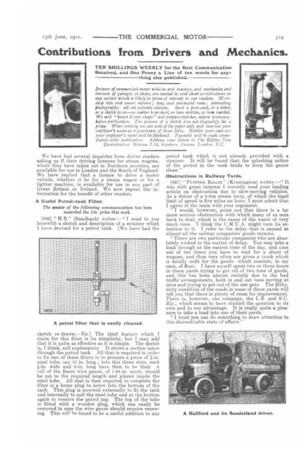Contributions from Drivers and Mechanics.
Page 19

If you've noticed an error in this article please click here to report it so we can fix it.
TEN SHILLINGS WEEKLY for the Best Communication Received, and One Penny a Line of ten words for any
thing else published.
Drivers of commercial-motor velsides and tractors, and mechanics and foremen of garages or shops, are invited to send short contributions on any subject which is likely to prove of interest to ogr readers. 1,Vork• shop tips and smart repairs ; long and successful runs ; interesting photographs: all are suitable subjects. Send a post-card, or a letter, or a sketch to us—no matter how short, or how written, or how worded. We will "knock it into shape" and prepare sketches, where necessary. before publication. The absence of a sketch does not disqualify for a prise. When writing use one side of the aper only and men?ion your employer's name as a guarantee of bona fides. Neither your own nor your employer's 'raise will be disclosed. Payment will be made immediately after publication. Address your letters to The Editor, THE CONIMERCIAL MOTOR, 7-15. Nosebery Avenue, London, P.C.
We have had several inquiries from driver readers asking us if their driving licences for steam wagons, which they have taken out in Northern counties, are available for use in London and the South of England. We have replied that a licence to drive a motor vehicle, whether it be for a steam wagon or for a lighter machine, is available for use in any part of Great Britain or Ireland. We now repeat the information for the benefit of other readers.
A Useful Petrol-tank Filter.
The sender of the following communteatton has been awarded the 10s. prize this week.
[8861 " H.B." (Sandbach) writes :—" I send to you herewith a sketch and description of a strainer which I have devised for a petrol tank. [We have had the
sketch re-drawn.—ED.] The chief feature which I claim for this filter is its simplicity, but I may add that it is quite as effective as it is simple. The sketch is, I think, self-explanatory. It shows a section taken through the petrol tank. All that is required in order to fix one of these filters is to procure a piece of t-in. steel tube, say 10 in. long ; into this three slots, each
wide and 8-in, long have then to be filed. A roll of the finest wire gauze, of 1-64-in, mesh, should be cut to the required length and placed inside the steel tube. All that is then required to complete the filter is a brass plug to screw into the bottom of the tank. This plug is screwed externally to fit the tank and internally to suit the steel tube and at the bottom again to receive the petrol tap. The top of the tube is fitted with a wooden plug, which can easily be removed in case the wire gauze should require renewing. This will he found to be a useful addition to any
petrol tank which is not already provided with a strainer. It will be found that the splashing action of the petrol in the tank tends to keep the gauze clean."
Obstructions in Railway Yards.
[887] "PUFFING BILLIE " (Kennington) writes :—" rt was with great interest I recently read your leading article on obstruction due to slow-moving vehicles. As a driver of a 5-ton steam lorry, of which the legal limit of speed is five miles an hour, I must admit that I agree in the main with your argument.
"I would, however, point out that there is a far more serious obstruction with which many of us men have to deal, which is the cause of the waste of very much tune. I think the C.M.U.A. might turn its attention to it. I refer to the delay that is caused at almost all the railway companies' goods termini.
"There are two particular companies who are absolutely wicked in the matter of delay. You may take a load through at the easiest time of the day, and nine out of ten times you have to wait for a shunt of wagons, and then very often are given a truck which is totally unfit for the goods—which consists, in my case, of flour. I have myself spent two or three hours in these yards trying to get rid of two tons of goods, and this has been almost entirely due to the bad traffic arrangements, both in and out vans moving at once and trying to get out of the one gate. The filthy, dirty condition of the roads in some of these yards will tell you that there is plenty of room for improvement. There is, however, one company, the L.B. and S.C. Rly., which seems to have studied the question to its own and to our advantage. It is really quite a pleasure to take a load into one of their yards.
"I trust you can do something to draw attention to this discreditable state of affairs."




















